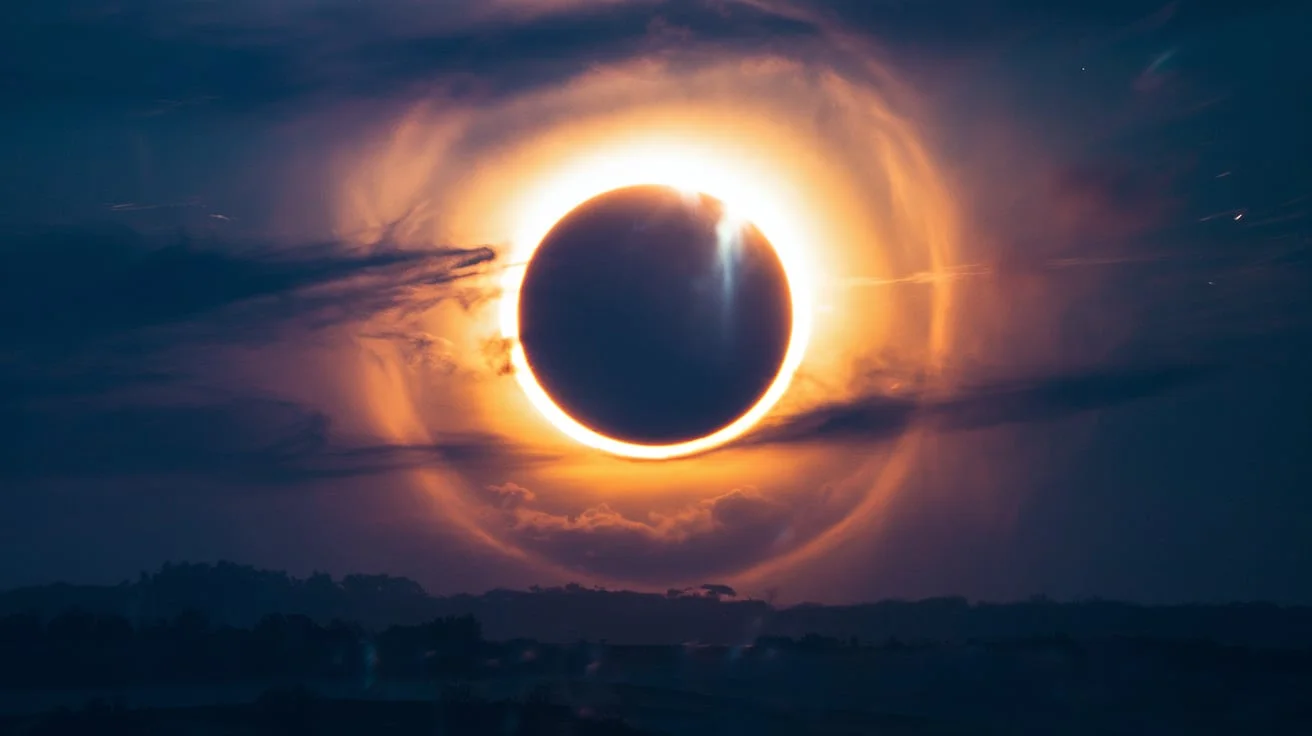Last Updated on October 15, 2024 by James Wilson
Solar eclipses have always fascinated humanity, invoking feelings of awe, mystery, and reverence. Throughout history, these celestial events have been interpreted in a variety of ways—some scientific, some spiritual, and many others as symbolic omens or messages from higher powers. As we approach the solar eclipse on April 8, 2024, there is a unique opportunity to reflect not only on the scientific marvel but also on its spiritual significance in both biblical and modern contexts.
In this blog post, we’ll explore the rich history of solar eclipses, their references in the Bible, spiritual lessons they can teach us, and what makes the 2024 eclipse particularly special. We will also provide practical tips for safely viewing this spectacular event.
Solar Eclipses in Ancient Times
Historical Significance in Different Cultures
Solar eclipses were often viewed as significant events by ancient cultures, with interpretations that varied widely. For example:
- Babylonians saw eclipses as omens, often signaling the death of a king or the collapse of an empire. Eclipses were carefully recorded, and astrologers interpreted their meaning based on the timing and location.
- Ancient Egyptians viewed solar eclipses as chaotic events. They believed that the sun god Ra was being temporarily devoured by the serpent Apep. Eclipses were seen as battles between light and dark forces.
- In China, eclipses were seen as warnings from the heavens. The Chinese word for eclipse, “shi,” means to eat, and it was believed that a dragon or a celestial dog was consuming the sun.
These ancient beliefs show a common thread—eclipses were signs of impending change or disruption. Whether viewed with fear or reverence, they were never seen as just another natural occurrence.
Interpretations Across Different Regions
While Babylonians, Egyptians, and the Chinese had strong spiritual views, the Greeks took a more philosophical approach. Greek astronomers like Ptolemy sought to understand the celestial mechanics behind eclipses, which laid the foundation for modern astronomy. Despite this, many still believed eclipses were associated with the gods.
Eclipses as Harbingers of Change
In various cultures, eclipses were often tied to political or environmental shifts. Records from ancient Mesopotamia suggest that leaders would take extraordinary precautions during an eclipse, such as appointing substitute kings to take the brunt of any divine wrath. These beliefs underscore the mystical power eclipses held in the minds of ancient peoples.
Biblical References to Solar Eclipses
Eclipses in Scripture
The Bible contains several passages that scholars believe could be referencing solar eclipses. For instance:
- In Amos 8:9, the Lord says, “I will make the sun go down at noon and darken the earth in broad daylight.” Many interpret this as a clear allusion to an eclipse.
- Joel 2:31 mentions, “The sun shall be turned into darkness, and the moon into blood,” often interpreted as a prophetic description of an eclipse and a blood moon.
While there are no explicit mentions of solar eclipses, the symbolic darkening of the sun is frequently used in apocalyptic literature to signify God’s intervention or judgment.
Interpretations by Biblical Scholars
Some biblical scholars argue that these references to the darkening of the sun should be understood metaphorically rather than literally. However, others see a direct correlation between historical eclipses and events in biblical history. For example, some believe the eclipse recorded in 763 BC coincided with the prophesied destruction of Nineveh, adding to the perception of eclipses as divine messages.
Symbolism of Darkness and Light
In the Bible, light is often a symbol of truth, divine presence, and righteousness, while darkness represents ignorance, evil, or God’s judgment. A solar eclipse, then, might symbolize a temporary removal of divine favor, or a period of spiritual testing or transition.
Spiritual Lessons from Solar Eclipses
Metaphysical Significance
From a spiritual perspective, solar eclipses are often seen as metaphors for personal transformation. The brief period of darkness can represent moments of confusion or doubt in life, followed by a return to clarity and enlightenment. Eclipses remind us that light and darkness are part of the same cycle, and both have their place in our spiritual growth.
Spiritual Warnings or Promises?
Some spiritual traditions interpret solar eclipses as warnings—moments to reflect on the state of the world or one’s personal life. Others view them as promises of renewal, emphasizing that even in moments of darkness, light will soon return.
Connection to Personal Transformation
Just as the moon temporarily obscures the sun, we all face moments in life where clarity is hidden from us. However, eclipses also remind us that darkness is temporary. Many spiritual leaders encourage using an eclipse as a time for introspection, to reflect on personal challenges and opportunities for growth.
April 8th, 2024 Solar Eclipse: Significance and Reflection
Astronomical Details
The upcoming solar eclipse on April 8, 2024, will be visible across parts of North America, including the United States, Canada, and Mexico. The path of totality—the area where the eclipse will be completely visible—will stretch from Mexico, through Texas, up to the northeastern United States.
- Duration of totality: Up to 4 minutes and 28 seconds
- Best viewing locations: Cities like Dallas, Indianapolis, and Cleveland will experience total darkness during the eclipse.
| Location | Totality Duration | Path of Eclipse |
| Mexico | 4 min 28 sec | Enters from Pacific coast |
| Texas | 4 min 20 sec | Moves northeast |
| Ohio | 3 min 50 sec | Path of totality ends |
This eclipse is significant because it is one of the longest total solar eclipses in North America in recent memory. It offers a rare chance for those in its path to experience a full solar blackout.
Spiritual Significance in the Modern Context
In today’s spiritual context, the eclipse is seen as an opportunity to pause and reflect on the state of the world and one’s personal life. As a rare celestial event, it invites individuals to meditate on the balance between light and darkness, both literally and metaphorically.
Cultural Relevance
Eclipses are no longer seen with the fear or awe that ancient civilizations held, but they still carry profound cultural significance. Whether viewed scientifically or spiritually, an eclipse offers a shared moment of wonder, reminding humanity of the grandeur of the cosmos.
Modern Perspectives and Observations
Scientific Understanding of Solar Eclipses
Today, we understand solar eclipses as the result of the moon passing between the Earth and the sun. The phenomenon is caused by the precise alignment of the three celestial bodies, with the moon covering the sun either partially or entirely.
Advances in Eclipse Observation Technology
Modern technology has transformed how we observe and study solar eclipses:
- Telescopes and satellites track eclipses with remarkable precision, providing real-time data on the event’s timing and scope.
- Advances in solar photography allow for breathtaking images of the eclipse, showing the sun’s corona and other details that were once invisible to the naked eye.
Spiritual Interpretations in the Modern Era
Despite scientific advancements, solar eclipses continue to carry spiritual meaning for many people. Some view these events as reminders of the delicate balance of nature, while others see them as moments to pause and reflect on personal or societal issues.
Where to See the Solar Eclipse of 2024
Locations of Totality
The best places to view the total eclipse on April 8, 2024, will be in cities like:
- Dallas, Texas
- Cleveland, Ohio
- Montreal, Canada
These locations will experience the eclipse for over 4 minutes, giving observers a rare chance to witness this cosmic event.
Travel and Viewing Considerations
Planning to see the eclipse in person? Here are some tips:
- Book early: Hotels and flights will fill up fast in cities along the path of totality.
- Arrive a day early: To avoid last-minute travel disruptions.
- Bring the right gear: Eclipse glasses, a camera with a solar filter, and a comfortable viewing spot will enhance the experience.
Global Viewing Options
For those outside the path of totality, there are still options:
- Many websites and observatories will offer live streaming of the event, allowing people from around the world to participate.
How to Safely View the Solar Eclipse
Eclipse Glasses and Eye Protection
Viewing a solar eclipse without proper protection can result in permanent eye damage. It’s crucial to use certified eclipse glasses that meet ISO standards for eye safety. Regular sunglasses won’t offer adequate protection.
Eclipse Viewing Equipment
If you want to capture the eclipse on camera, consider using:
- A camera with a solar filter
- Telescopes or binoculars with solar filters
- Tripods for stability during long-exposure shots
Alternative Viewing Methods
For those without access to eclipse glasses, there are safe, indirect methods:
- Pinhole cameras: Create a simple projector using cardboard to view the eclipse without looking directly at the sun.
- Reflections: Using reflective surfaces like water or mirrors can provide an indirect view of the eclipse.
Conclusion: A Spiritual and Celestial Event to Remember
The solar eclipse of April 8, 2024, offers a rare opportunity to witness one of nature’s most awe-inspiring events. Whether you view it through a spiritual lens, interpreting it as a moment for personal reflection and growth, or through the scientific marvel of celestial mechanics, this eclipse holds significance for everyone.
Remember, solar eclipses remind us that darkness is fleeting, and even in the most shadowed moments, light is never far away. Use this eclipse as an opportunity to contemplate the balance of light and dark in your life, and embrace the spiritual lessons it may bring.

Matthew Porter combines his passion for theology with an extensive study of dreams. His analytical approach and eloquent writing style make complex interpretations accessible, helping readers uncover the hidden messages in their dreams and connect with their spiritual path.










